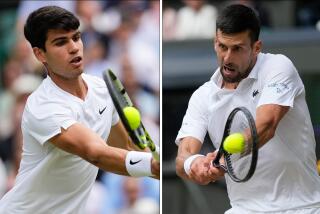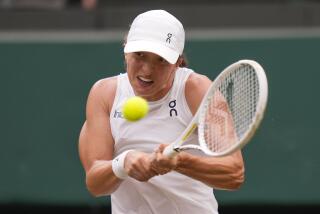Truth Is, McEnroe’s on Target
- Share via
Long ago, he’d given up all hope of having any kind of impact on another Wimbledon championship final. He’d had his last chance, his window of opportunity had been painted shut. He would devote the rest of his natural life to sitting and stewing about what might have been.
But two years after Steffi Graf abandoned him on the eve of Wimbledon’s mixed doubles semifinals, John McEnroe was back at Center Court, lending a considerable hand to one of the most unlikely success stories ever waved under the nose of the All England Club.
With Goran Ivanisevic’s emotional fuel tank running on empty after his three-day, rain-delayed semifinal ouster of Tim Henman, McEnroe provided the motivational fodder Ivanisevic needed to carry on through five more soul-sapping sets in Monday’s men’s singles final against Pat Rafter.
Truth be told, which is exactly what gets him into so much trouble, it was not much of a shot, not worthy of even a blip on the legendary McEnroe Richter scale. What McEnroe had said was obvious: That Ivanisevic, ranked 125th in the world and allowed into this tournament only by the grace of a wild-card pass, had reached the Wimbledon final simply on the strength of his first serve.
Yes, and the sky is blue, and it is wet in London in July, and the English are very good at inventing sports and then watching the rest of the world walk away with all the trophies.
Ivanisevic reacted as if McEnroe had wiped his feet on the Croatian flag.
McEnroe, he said, was a great player in his day but something far less as a person.
“The way he’s commenting, giving everybody [a hard time], saying, ‘This guy is bad, this guy is going to choke, this guy is not good’--I mean, nobody is good enough for him,” Ivanisevic railed.
Now, as we have read and heard many times during this tournament, Ivanisevic can be two people. He can be Goran the Good, he can be Goran the Bad. But Goran the media critic?
Keep working on that serve, big guy.
At Wimbledon, McEnroe is everywhere at once--chatting up the BBC, writing guest columns for the Daily Telegraph, providing color analysis for NBC. For two weeks in London, there is no getting away from OmniMac, no way of stopping him. His is the mouth that never sleeps. Hook him up to a power generator and he could keep the Piccadilly tube line running the entire fortnight.
The man has sent millions of words over the airwaves and into the broadsheets during this tournament. These few about Ivanisevic and his first serve were nothing more than harmless pebbles amid the verbal avalanche--something of a compliment, really, if you think about it. It’s like saying Nolan Ryan is in the Hall of Fame only on the strength of his fastball. An exaggeration, no doubt, but a colorful way of saying: How about that heat?
“Is there anyone who’s ever watched a tennis match that doesn’t know that his serve is by far his biggest weapon?” McEnroe said with a bemused laugh during NBC’s telecast of the final.
A moment later, a camera zoomed in on the courtside service speed monitor, blinking “128 mph” on an ace just delivered by Ivanisevic, to underscore McEnroe’s point. “I don’t think anything was said that people don’t already know.”
And this sort of thing is nothing new from McEnroe, who has argued for years that the power-serve approach to men’s lawn tennis, which has left us with such one-note Wimbledon champions as Michael Stich and Richard Krajicek, is no good for tennis.
“For me, as a player, I can understand him just wanting to end the point and win the match, 6-0, 6-0,” he said. “But for entertainment value, you want to see a lot of rallies and five sets. He doesn’t appreciate my concern about that.”
McEnroe compared Ivanisevic to Randy Johnson, baseball’s present-day Ryan equivalent, who also can be “incredibly dominating” with his delivery. “But as great as Johnson is,” he said, “you like to see some home runs and some rallies.”
Noting the baseline-to-net versatility Ivanisevic displayed against Rafter, McEnroe added, approvingly, “He’s shown some of that today. . . . He’s had an outstanding day.”
This is where Ivanisevic misfired on McEnroe, whose Mac the Terrible reputation as a commentator is vastly overrated. McEnroe is no toadying Dick Vitale, but he’s no Bill Walton, either. McEnroe will mix it up--and was generous in his praise of Ivanisevic against Rafter and the quality of Monday’s final.
“The greatest Wimbledon final I’ve seen,” he called it, which, for McEnroe, meant taking his own classic finals against Bjorn Borg and Jimmy Connors and moving them down a notch.
McEnroe’s role as color analyst is no different from Ivanisevic’s as a player. He is there to entertain, to engage the spectator, to enhance the event. McEnroe succeeds because he is unafraid to speak his mind and doesn’t care whom he offends in the process. It is a rare quality in sports broadcasting, a field dominated by too many ex-players who would rather drink beer with Ivanisevic than risk having their names dropped derisively during the postmatch news conference.
“Got to take the good with the bad,” McEnroe said of his lot as a tennis analyst. “You can’t please everybody.”
Sometimes, you wind up inadvertently helping make history, speaking the words that inspire an erratic big-serving left-hander to a triumph previously unimaginable.
“If that’s what it takes,” McEnroe mused between Ivanisevic first-serve aces, “I’ll suffer the consequences.”
More to Read
Go beyond the scoreboard
Get the latest on L.A.'s teams in the daily Sports Report newsletter.
You may occasionally receive promotional content from the Los Angeles Times.










